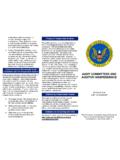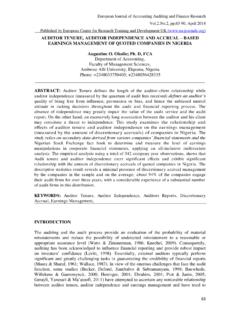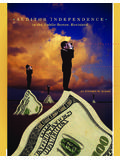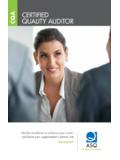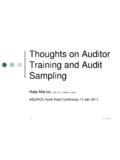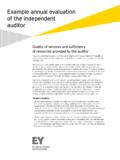Transcription of AUDITOR INDEPENDENCE, PROFESSIONAL …
1 GEORGIA SOUTHERN FRAUD AND FORENSIC ACCOUNTING CONFERENCE PRESENTED BY FRANCINE MCKENNA MAY 16, 2013 AUDITOR independence , PROFESSIONAL skepticism , auditors ' FRAUD OBLIGATIONS: CASE STUDIES AND EXAMPLES AGENDA Recent Data A Review of AUDITOR independence Including Some Less Often Discussed Provisions A Review of PROFESSIONAL skepticism In The Standards and In Regulator Comments The auditors Obligations Regarding Fraud and Other Illegal Acts Case Studies Resources RECENT DATA The CAQ recently commissioned the authors of a 2010 report, Fraudulent Financial Reporting: 1998 2007, An Analysis of Public Companies to review the enforcement actions included in that study, provide a descriptive analysis of those investigations where the SEC sanctioned either the AUDITOR or the audit firm and expand the study period through December 2010.
2 From 1998 2010, the authors identified 87 instances of SEC investigations of fraudulent financial reporting leading to sanctions against auditors . RECENT DATA The SEC issued sanctions against individual auditors in 80/81 cases and sanctions against the audit firm in 27/81 instances. 26 cases involved sanctions against both. Most cases involved multiple alleged deficiencies. The top five areas cited by the SEC in these cases: Failure to gather sufficient competent audit evidence (73 percent of the cases) Failure to exercise due PROFESSIONAL care (67 percent) Insufficient level of PROFESSIONAL skepticism (60 percent) Failure to obtain adequate evidence related to management representations (54 percent) Failure to express an appropriate audit opinion (47 percent) RECENT DATA The study covers 1998 2010, but only 11 of the cases occurred in 2003 or later, post- Sarbanes-Oxley Act 2002.
3 Results track my results reported in Forbes magazine in October. The SEC filed only 79 accounting fraud and disclosure cases in 2012, 11% less than in 2011 when there were 89, the fewest, by far, in a decade. Less general accounting fraud enforcement by SEC leads to fewer sanctions against the auditors . One follows the other. But even when SEC addresses general accounting fraud, enforcement against auditors and especially firms is rarer and rarer. AUDITOR independence The independence Standard (SEC Final Rule 10/12/01) independence generally is understood to refer to a mental state of objectivity and lack of bias. The amendments retain this understanding of independence and provide a standard for ascertaining whether the AUDITOR has the requisite state of mind. The first prong of the standard is direct evidence of the AUDITOR 's mental state: independence "in fact.
4 " The second prong recognizes that generally mental states can be assessed only through observation of external facts; it thus provides that an AUDITOR is not independent if a reasonable investor, with knowledge of all relevant facts and circumstances, would conclude that the AUDITOR is not capable of exercising objective and impartial judgment. AUDITOR independence AICPA AUDITOR independence Section 201 Sarbanes-Oxley Act Prohibited services Audit Committee pre-approval Additional disclosures Permitted non-audit tax services Audit partner rotation Audit partner compensation AUDITOR /Client revolving door AUDITOR /Audit Committee communication An AICPA/SEC independence Rule Comparison AUDITOR independence These AICPA independence Interpretations of Rule 101 have no specific corresponding SEC rules: Interpretation 101-4 Honorary directorships and trusteeships of not-for-profit organization.
5 Interpretation 101-6 The effect of actual or threatened litigation on independence Interpretation 101-10 The effect on independence of relationships with entities included in the governmental financial Relationships. Interpretation 101-11 Modified application of Rule 101 for certain engagements to issue restricted-use reports under the Statements on Standards for Attestation Engagements. Interpretation 101-14 The effect of alternative practice structures on the applicability of independence rules. AUDITOR independence Section 201 Sarbanes-Oxley Act Prohibited Services (Internal audit, systems design and implementation, bookkeeping, etc.) Audit Committee Pre-approval Additional Disclosures Permitted Non-audit Tax Services KPMG GE EY and HP, News Corp, Walmart EY UK on country-by-country reporting Audit partner rotation 7/2 to 5/5 plus concurring partner) Audit partner compensation AUDITOR /Client revolving door AUDITOR /Audit Committee Communication AUDITOR independence Section 201 other topics Conflicts presented by consulting practices (Perception versus reality of roles, no oversight, audit takes a back seat.
6 The rapid rise in the growth of non-audit services has increased the economic incentives for the AUDITOR to preserve a relationship with the audit client, thereby increasing the risk that the AUDITOR will be less inclined to be objective. October 12, 2001 SEC Final Rules. Deloitte Standard Chartered Deloitte JPM Foreclosure Reviews Deloitte Marin County SAP Implementation Deloitte Kabul Bank KPMG due diligence HP acquisition of Autonomy KPMG, EY due diligence CAT acquisition of ERA, Chinese company PwC Thomason Reuters Tax Software alliance auditors and corporate investigations (EY Lehman case) AUDITOR independence Business Alliances Rule 2-01 (b) of Regulation S-X (17 CFR ), amended under SOx to enhance AUDITOR independence after the Enron/Arthur Andersen, provides the standard used to judge a business relationship between a company and its AUDITOR or services provided to an audit client: Does the relationship create a mutual or conflicting interest between the accountant and the audit client?
7 Examples: EY PeopleSoft, PwC Thomson Reuters, Deloitte Autonomy/HP AUDITOR independence Insider Trading By Public Accounting Firm Professionals Client confidentiality breach compounded by, perhaps, violation of financial interest rules auditors /Audit Engagements Scott London KPMG - Tipper Tom Flanagan Deloitte Tipper and Trader Other Firm Professionals James Gansman EY - Tipper Arnie McClellan Deloitte Inadvertent Tipper PwC Transaction Services Staff - Traders PROFESSIONAL skepticism PCAOB Staff Audit Practice Alert No. 10, Maintaining and Applying PROFESSIONAL skepticism in 12/4/12 PCAOB standards define PROFESSIONAL skepticism as an attitude that includes a questioning mind and a critical assessment of audit evidence, and it is essential to the performance of effective audits under Board standards. The PCAOB continues to observe instances in which circumstances suggest that auditors did not appropriately apply PROFESSIONAL skepticism in their audits.
8 Alert focuses on the importance of PROFESSIONAL skepticism , the appropriate application of PROFESSIONAL skepticism in audits, and certain important considerations for audit firms' quality control systems. PROFESSIONAL skepticism AND EXTERNAL AUDIT It seems auditors have never been skeptical enough An examination of SEC Enforcement Actions 1987-1997 found 60% of enforcement actions related to a lack of PROFESSIONAL skepticism . Beasley et al. (2001) PCAOB s 2008 review of first four years of inspections of eight largest accounting firms found deficiencies attributable, at least in part, to lack of PROFESSIONAL skepticism when performing audit procedures and performing audit tests. PCAOB 2008 REPORT "In some instances, firms did not sufficiently test or challenge management's forecasts, views, or representations that constituted critical support for amounts recorded in the financial in recent years, we are seeing deficiencies in the most important and high-risk areas of the audits, where appropriate levels of care and PROFESSIONAL skepticism are needed," wrote George Diacont, director of the PCAOB registration and inspections division.
9 Dec. 8, 2008 PCAOB INSPECTION PART TWO DISCLOSURES Deloitte - Part Two Private Report for 2008 inspections of 2007 audits disclosed publicly October 2011. The nature and number of the reported deficiencies identified by the inspection team (including, in nine of the 61 engagements reviewed, the Firm's failure to obtain sufficient competent evidential matter, at the time it issued its audit report, to support its audit opinion) suggest that important issues may exist sufficiency of the Firm's emphasis on the critical need to exercise due care and PROFESSIONAL skepticism when performing audits. PCAOB INSPECTION PART TWO DISCLOSURES PwC Part Two Private Report for 2009, 2010 inspections of 2009, 2008 audits disclosed publicly 3/2013. From 2009 report: The nature and number of the reported deficiencies identified by the inspection team (including, in six of the 50 engagements reviewed, the Firm's failure to obtain sufficient competent evidential matter, at the time it issued its audit report, to support its audit opinion) suggest that important issues may exist sufficiency of the Firm's emphasis on the critical need to exercise due care and PROFESSIONAL skepticism when performing audits.
10 PROFESSIONAL skepticism AND EXTERNAL AUDIT The concept is pervasive in the standards SAS 1 (AICPA, 1997) SAS 82 (AICPA, 1997) SAS 99 (AICPA, 2002) AU Due PROFESSIONAL care requires the AUDITOR to exercise PROFESSIONAL skepticism . Because of the characteristics of fraud, the AUDITOR 's exercise of PROFESSIONAL skepticism is important when considering the risk of material misstatement due to fraud. PROFESSIONAL skepticism is an attitude that includes a questioning mind and a critical assessment of audit evidence. PROFESSIONAL skepticism requires an ongoing questioning .. the AUDITOR should not be satisfied with less-than-persuasive evidence because of a belief that management is honest. PROFESSIONAL skepticism AND EXTERNAL AUDIT Biases that are inherently created by the structure of the AUDITOR -client relationship can be amplified by other aspects of human nature.
